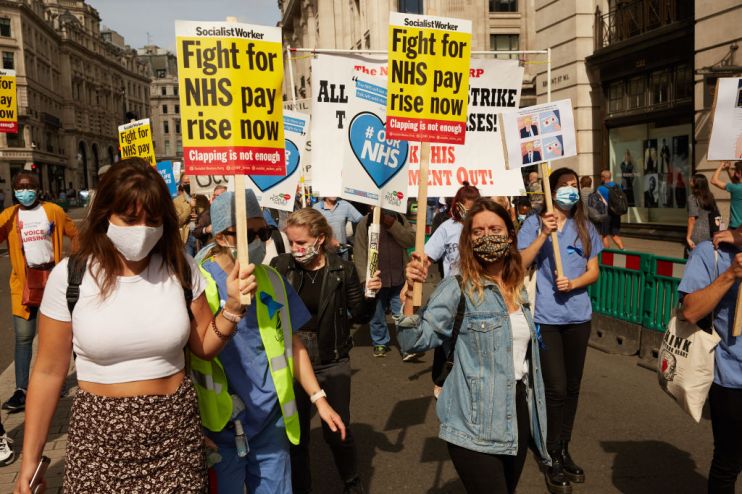Doctors call for strike action over ‘derisory’ pay offer as Covid hospitalisations rise

Thousands of doctors have condemned the government’s “shambolic and derisory” 3 per cent pay rise offer to NHS staff in England, threatening industrial action as Covid hospitalisations soar.
Lobbying organisation The Doctors’ Assocation (DAUK) said the 3 per cent offered “does not come close to what staff deserve” and was an “insult” from the government when the NHS has been immensely challenged by the pandemic.
DAUK also said the pay offer represents a pay cut in real terms, as inflation this year is estimated at 3.7 per cent.
The pay rise covers nurses, paramedics, consultants, dentists and salaried GPs. But crucially, it does not cover England’s 61,000 junior doctors – who make up more than 50 per cent of doctors in the NHS.
Junior doctors are three quarters of the way through a separate four-year deal that gives them 2 per cent pay rises each year, but their exclusion from the 3 per cent rise was “callous in view of the large number of doctors in training who have worked tirelessly through the pandemic,” the DAUK said in a statement.
Many have been called away from their area of expertise and had to cover rota gaps due to continuous under-staffing – especially during the ongoing “pingdemic”.
One junior doctor told City A.M that the pay rise “forgot everyone who’s had their training disrupted during the pandemic or been called up early from medical school.”
But asked if the pay row would risk a repeat of the junior doctor strikes in 2015 and 2016, they said: “It’s not like the last strike, as there’s an ongoing pandemic now.”
DAUK said it planned to hold an emergency meeting with its members to formulate next steps after it consulted with members and the “overwhelming majority of respondents” had supported industrial action.
“Any improvement on the derisory 1 per cent previously offered to NHS workers is welcomed, but 3 per cent barely takes the edge off the erosion of doctors’ pay over two decades,” said DAUK chair Dr Jenny Vaughan.
“Doctors in the NHS have suffered a 30 per cent pay cut in real terms, and after inflation this ‘pay rise’ will ultimately be a pay freeze,” she added.
Asked whether industrial action was on the cards for nurses, Pat Cullen, interim general secretary of the Royal College of Nursing (RCN), told the BBC “we will put that to our nurses next week in a consultative ballot and they will decide”.
The controversy surrounding the pay offer came as the number of patients admitted to hospital for Covid-19 reached its highest level since 25 February, according to NHS England data.
A total of 752 Covid hospital admissions were reported on 19 July – a rise of 21 per cent on the previous week.
Coronavirus cases spiked on Tuesday, when the UK recorded 46,558 new positive cases in 24 hours – up 40.7 per cent compared to the same day the week before.
Dr Duranka Perera, junior doctor and DAUK Treasurer, said: “After over a decade of austerity and real terms pay cuts, a 15 per cent pay increase is the bare minimum we at DAUK see as acceptable.”